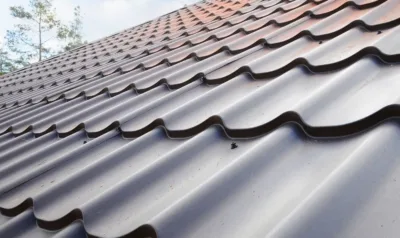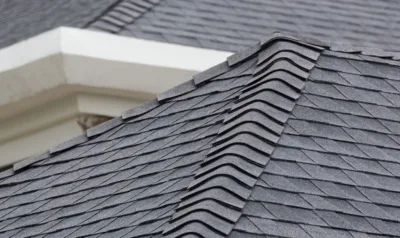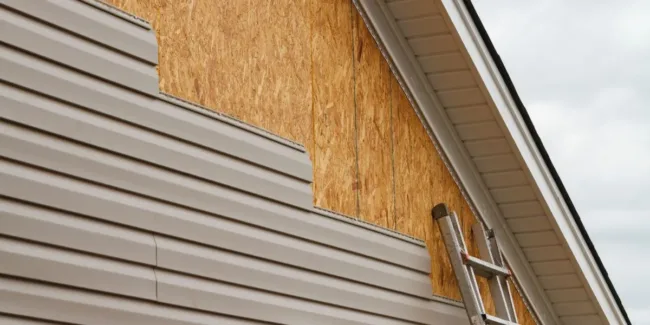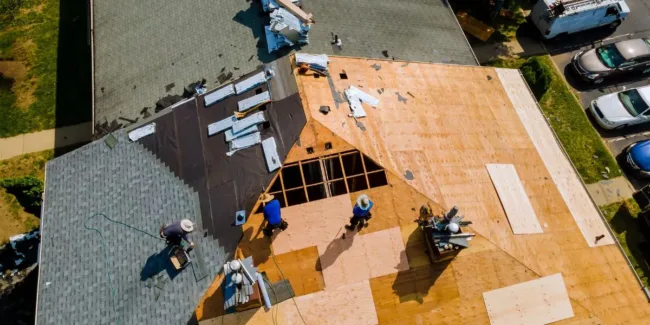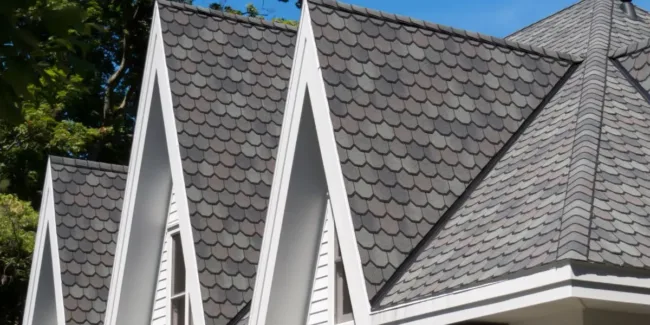What Is The Best Roofing for Virginia Homes?
When choosing roofing for a home in Virginia, two materials stand out for their consistent performance and wide homeowner appeal: architectural asphalt shingles and metal roofing.
Asphalt shingles remain the most widely used option thanks to their affordability, ease of installation, and flexible design, making them an ideal fit for most neighborhoods and budgets. On the other hand, metal roofing is gaining ground for its exceptional durability, energy efficiency, and storm resistance – features that are especially valuable in Virginia’s varied climate. Whether you’re prioritizing upfront savings or long-term resilience, these two roofing types offer the best combination of performance, appearance, and value for Virginia homeowners.
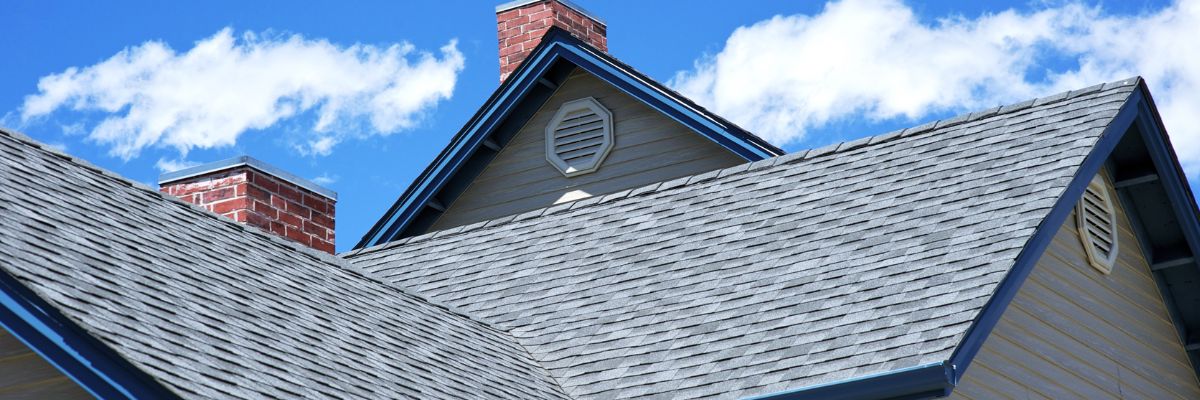
Architectural Asphalt Shingles
Architectural asphalt shingles are the most common roofing material in Virginia for good reason. These shingles typically last between 20 and 30 years, offering a reasonable lifespan at a relatively low cost.
They provide strong resistance against heat, humidity, and moderate storms, making them suitable for most areas across the state. Homeowners also appreciate the broad range of color and texture options, which can complement everything from traditional Colonial homes to newer suburban designs.
Repairs are usually straightforward, and installation is simple, keeping labor costs down. Some premium architectural shingles are also rated for wind and impact resistance, adding a layer of protection against Virginia’s seasonal storms.
However, they can be prone to discoloration and algae growth in humid regions if not treated with protective coatings, and they are more susceptible to damage in extreme wind events compared to more durable materials like metal or slate.
Benefits:
- Typically last between 20 and 30 years
- Good resistance to heat, moisture, and moderate storm activity
- Available in a wide array of colors and textures to complement any home style
- Easy to install and repair
- Many products are rated for wind and impact resistance
Limitations:
- Shorter lifespan than metal, slate, or synthetic roofing
- Vulnerable to damage in extreme storms or high winds
- May discolor or grow algae in humid regions without protective coatings
Best For: Homeowners seeking a cost-effective and visually flexible roofing option with reasonable durability in Virginia’s seasonal climate.
Metal Roofing (Standing Seam or Ribbed Panels)
Metal roofing is rapidly becoming one of the most sought-after options for Virginia homes, especially in coastal or storm-prone regions like Virginia Beach or Norfolk. Known for its longevity, a metal roof can last 40 to 70 years or more with minimal upkeep.
It is exceptionally resistant to wind, rain, fire, and rot—ideal characteristics for areas that experience heavy storms or coastal moisture. Metal also reflects solar radiation, reducing cooling loads during Virginia’s hot summers and making it a smart choice for energy-conscious homeowners. Additionally, metal roofs shed water and snow efficiently, minimizing leak potential and preventing ice dams in colder areas.
While the upfront cost is significantly higher than asphalt, the long-term savings on repairs and energy bills can offset the initial investment. Some homeowners express concerns about noise during rainstorms, but modern installations often include insulation layers that help dampen sound. Metal may also dent from large hail or falling branches, but for most Virginia homes, the tradeoff is well worth the exceptional performance.
Benefits:
- Lasts 40 to 70 years or more with minimal maintenance
- Highly resistant to wind, rain, fire, and rot
- Reflects solar heat, helping reduce cooling costs during Virginia’s hot summers
- Eco-friendly and fully recyclable
- Excellent water shedding prevents leaks and ice dams in colder months
Drawbacks:
- Higher upfront cost compared to asphalt shingles
- Can be noisy during heavy rain unless paired with proper insulation
- May dent from large hail or falling branches
Best For: Long-term homeowners, energy-conscious buyers, and those in coastal or storm-prone areas of Virginia.
Slate Roofing
Slate is a high-end roofing material that offers timeless beauty and unmatched durability. With a lifespan of 75 to 100 years or more, slate is ideal for homeowners who want a permanent roofing solution. It is fireproof, rot-resistant, and impervious to most weather conditions, making it suitable for Virginia’s heat, humidity, and winter storms.
Slate’s natural look enhances the character of historic or luxury homes, particularly in older communities like Alexandria or Arlington. However, the weight of slate requires structural reinforcement, which increases both material and installation costs. Repairs can also be expensive, and the material is not suited for homes with lighter roof structures or limited budgets.
Benefits:
- Lifespan of 75 to 100 years or more
- Fireproof, rot-resistant, and highly durable
- Performs well in all Virginia weather, from summer heat to winter storms
- Enhances the aesthetic of historic or upscale homes
Limitations:
- High installation and repair costs
- Very heavy and requires additional structural support
- Not suited for every budget or home frame
Best For: Historic preservation, luxury properties, or homeowners who value natural materials and long-term performance.
Synthetic Roofing (Slate or Shake Alternatives)
Synthetic roofing materials mimic the appearance of slate or cedar shake but are much lighter and easier to work with. These products offer strong resistance to cracking, moisture, UV damage, and pests, making them particularly well-suited to Virginia’s humid summers and seasonal storms.
Synthetic options typically last 30 to 50 years and require far less maintenance than the natural materials they emulate. Many products are available with wind- and impact-resistance ratings, providing peace of mind for homeowners in hurricane zones or storm-prone inland areas. Because they are lightweight, synthetic shingles don’t require special structural accommodations, making them a more accessible choice for many homes. These materials are especially appealing in historic districts where aesthetics matter but modern performance is still required.
Benefits:
- Lighter and easier to install than real slate or wood
- Resistant to cracking, moisture, UV damage, and pests
- Impact- and wind-resistant options available for storm-prone areas
- Typically lasts 30 to 50 years or more
- Lower maintenance and fewer structural demands
Climate Suitability:
- Handles Virginia’s humidity, heat, and storm cycles well
- Great option for areas with historic appearance requirements but modern building codes
Best For: Homeowners seeking a traditional appearance with modern performance and reduced maintenance concerns.
Wood Shingles and Cedar Shake
Wood shingles and cedar shakes are often chosen for their rustic charm and natural texture. They’re a good match for cottages, farmhouses, or historic homes where maintaining a traditional appearance is important. In Virginia’s climate, however, wood roofing requires significant upkeep. The material is vulnerable to mold, rot, and insect damage unless treated regularly. Frequent sealing and cleaning are essential to ensure its longevity. Even with proper care, wood roofing typically lasts only 20 to 30 years, which is on par with asphalt but at a higher maintenance cost. For homeowners who value authenticity and are prepared for ongoing upkeep, wood can still be a worthwhile option.
Benefits:
- Beautiful natural finish that ages gracefully
- Provides moderate insulation benefits
- Matches the character of older or traditionally styled homes
Limitations:
- Requires frequent sealing, cleaning, and maintenance to resist mold, rot, and insect damage
- Less suited to Virginia’s humid conditions without proper treatment
- Typically lasts 20 to 30 years with diligent care
Best For: Homeowners who prioritize traditional curb appeal and are willing to commit to ongoing maintenance.
Clay and Concrete Tiles
Clay and concrete tiles are less common in Virginia but can be a great choice for homes with Mediterranean or Spanish-inspired architecture. These materials are known for their long lifespan—often 50 to 100 years—and outstanding fire and UV resistance. Clay and concrete are also non-combustible and immune to insect and rot issues. However, these tiles are very heavy and often require additional structural support. Installation costs are high, and the materials may not be appropriate for homes with steep roof pitches or lightweight frames. In regions of Virginia with high sun exposure, like central and southern parts of the state, tile roofing can perform exceptionally well, but it’s best suited for homes specifically designed to support the weight.
Benefits:
- Lifespan of 50 to 100 years
- Excellent resistance to fire and UV damage
- Non-combustible and impervious to rot and insects
- Available in Spanish, Mediterranean, or modern flat profiles
Limitations:
- Heavier than most materials and may require structural reinforcement
- High upfront material and labor costs
- Not ideal for steep or lightweight roof structures
Best For: Homes with Mediterranean or southwestern design influences and homeowners prioritizing durability and fire resistance.
Comparative Table
| Roofing Material | Lifespan | Weather Resistance | Maintenance | Upfront Cost | Best For |
|---|---|---|---|---|---|
| Architectural Asphalt | 20–30 years | Good (heat, storms) | Low–Moderate | $ | Budget-friendly and versatile |
| Metal Roofing | 40–70+ years | Excellent (wind, rain, sun) | Low | $$–$$$ | Long-term energy efficiency |
| Slate Roofing | 75–100+ years | Excellent (all conditions) | Low | $$$$ | Historic or high-end homes |
| Synthetic Slate/Shake | 30–50+ years | Excellent | Low | $$$ | Traditional look with modern benefits |
| Wood/Cedar Shake | 20–30 years | Fair–Good (needs upkeep) | High | $$$ | Rustic and historic aesthetics |
| Clay/Concrete Tile | 50–100 years | Excellent (fire, sun) | Low | $$$$ | Mediterranean or fire-prone zones |
Key Considerations for Virginia Homes
Energy Efficiency
Virginia’s long, humid summers make it essential to choose materials that reflect sunlight and minimize heat absorption. Metal roofing and reflective asphalt shingles are excellent for lowering air conditioning costs. Synthetic options also perform well when combined with radiant barriers and ventilation systems.
Weather Protection
Roofing must resist moisture intrusion, UV exposure, and sudden storms. Wind-rated shingles, impact-resistant tiles, and tightly sealed seams are critical, especially in hurricane-prone areas near the coast.
Architectural Compatibility
Roofing materials should match the architectural style of your home. Slate is ideal for colonial or historic properties, while metal suits contemporary or farmhouse designs. Asphalt shingles offer broad adaptability to most styles.
Budget and Long-Term Value
Consider not only the initial installation cost but also the expected lifespan, maintenance needs, and energy savings. Architectural asphalt provides strong value on a budget, while metal and synthetic roofing offer long-term cost advantages despite higher upfront investment.
Professional Installation
Proper installation ensures your roof can withstand Virginia’s changing weather. Underlayment, flashing, ventilation, and ridge caps all contribute to a roof’s long-term performance. Local professionals understand regional codes and climate nuances.
Expert Recommendations
Best Value and Versatility
Architectural asphalt shingles are the best choice for homeowners who want affordability, wide color selection, and good weather protection without complex installation or structural upgrades.
Longest Lifespan and Durability
Standing seam metal roofing delivers superior longevity, durability in harsh weather, and excellent energy efficiency, making it worth the higher upfront cost.
Historic and Luxury Homes
Slate roofing or synthetic slate is the top pick for upscale homes and properties in historic districts. These materials preserve traditional aesthetics while offering long-term reliability.
Energy-Conscious Buyers
Metal roofing and reflective asphalt shingles significantly reduce cooling costs during Virginia’s warmest months, especially when paired with attic insulation and proper ventilation.
Conclusion
Choosing the best roofing material for your Virginia home involves balancing budget, performance, aesthetic goals, and local weather challenges. Whether you prefer the cost-efficiency of asphalt shingles, the resilience and energy savings of metal, or the timeless elegance of slate, there is a solution tailored to your needs. Consult with local roofing professionals to assess your home’s structure and select the roofing system that will protect and enhance your property for decades.
Ready to upgrade your roof? Contact Home Genius Exteriors for expert guidance, premium roofing materials, and professional installation tailored to Virginia’s climate. Our team is here to help you choose the best roofing solution for long-term performance, energy savings, and curb appeal. Schedule your free consultation today.

